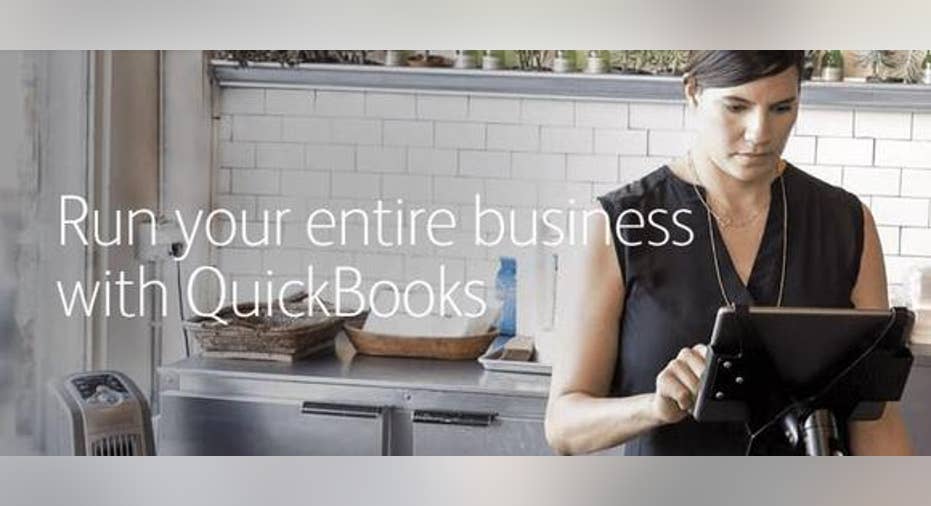Intuit Inc. Can't Get Everyone to Switch to QuickBooks Online

Source: Intuit
Small business and tax software specialist Intuit is in the midst of atransition. Like many software companies, it's working to shift its distribution strategy and customer base from one centered around the desktop to one dependent on the cloud.
Historically, Intuit has sold its core QuickBooks software in the form of traditional applications. For a few hundred dollars, a small business owner gets access to the latest version of Intuit's QuickBooks software suite. But in recent years, QuickBooks has been working to transition its customers to its cloud-based alternative, QuickBooks Online (QBO). The growth of QBO has been impressive, and it's emerged as a key metric for Intuit investors.
Intuit has made every attempt to drive customers to QBO, but its efforts haven't always gone according to plan. On its February earnings call, Intuit CEO Brad Smith discussed one important failure the company experienced last year.
The steady growth of QBOFor many, QBO is inherently more appealing than traditional QuickBooks, as it's more affordable and offers more features. While the desktop version of QuickBooks requires a large, upfront investment of several hundred dollars, QBO is sold in the form of a subscription. Small businesses pay somewhere between $10 and $25 per month to access QBO. In addition, it offers exclusive features, like access to smartphone and tablet apps and automatic invoice scheduling.
Those advantages have fueled the growth of QBO in recent years. In the first quarter of its 2014 fiscal year, Intuit had just 516,000 QBO subscribers. That figure climbed to over 1.25 million last quarter.
Data Source: Intuit Q2 2016 Earnings Report.
For Intuit, QBO brings advantages over its traditional desktop software. QuickBooks desktop revenue is inherently lumpy, coinciding with the release of the latest version. Customers may befickle, and choose not to upgrade, or delay purchases at times of economicuncertainty. By moving to a subscription model, Intuit smooths out itsrevenue curve, and eliminates the risk that its customers may not find its latest release appealing.
Making the desktop less appealingIn an effort to drum up interest in QBO even further, Intuit raised the price of its QuickBooks desktop software in 2015, but kept the price of QBO steady. With a larger cost gap between the two products, Intuit's management reasoned that it would drive more of its customers to choose QBO.Unfortunately, that wasn't the case, and the move actually costIntuit revenue. Smith explained on the company's earnings call.
The experience taught Smith that attempts to aggressively shift customers from the desktop to QBO were futile. Some customers simply prefer desktop, and by raising the price, they're only competing with themselves, as customers opt to forgo upgrades inlieuof a QBO subscription. Smith believes that while the number ofQBO subscribers will increase meaningfully over time, its traditional QuickBooks desktop business may never go away entirely -- at least not anytime soon.
Finding growth online and on the desktopBy removing the roadblocks it needlessly erected last year, QuickBooks, in all its forms, appears poised for growth. Last quarter, the total number of QBO subscribers rose nearly 50% on an annual basis, and Intuit believes that it will enjoy annual growth of 43% next quarter. At the same time, Intuit sold 238,000 copies of its QuickBooks desktop software last quarter, up almost 15% from the same quarter 12 months prior. Over time, the popularity of desktop should recede somewhat, but in the near-term both portions of the QuickBooks business could continue to grow and reward shareholders.
The article Intuit Inc. Can't Get Everyone to Switch to QuickBooks Online originally appeared on Fool.com.
Sam Mattera has no position in any stocks mentioned. The Motley Fool owns shares of and recommends Intuit. Try any of our Foolish newsletter services free for 30 days. We Fools may not all hold the same opinions, but we all believe that considering a diverse range of insights makes us better investors. The Motley Fool has a disclosure policy.
Copyright 1995 - 2016 The Motley Fool, LLC. All rights reserved. The Motley Fool has a disclosure policy.



















